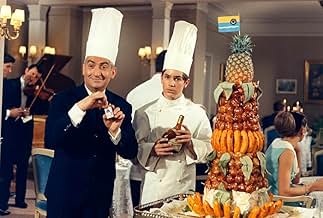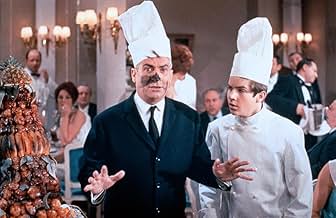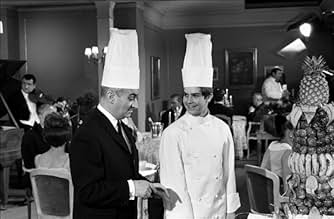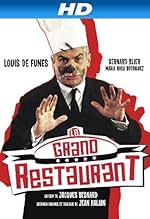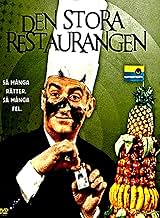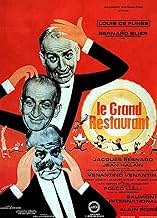VALUTAZIONE IMDb
6,7/10
7066
LA TUA VALUTAZIONE
Aggiungi una trama nella tua linguaTop-notch french restaurant owner Monsieur Septime is involved into crime when one of his famous guests disappears.Top-notch french restaurant owner Monsieur Septime is involved into crime when one of his famous guests disappears.Top-notch french restaurant owner Monsieur Septime is involved into crime when one of his famous guests disappears.
- Regia
- Sceneggiatura
- Star
Eugene Deckers
- Le complice de Novalès
- (as Eugène Deckers)
Recensioni in evidenza
Monsieur Septime (de Funès) is your (stereo)typical French restaurant manager...you know, the kind that perpetually inflates his own ego, disparages his employees and treats his patrons as royalty (unless, of course, they're German). While the film's plot is rather canned and disjointed, what makes this worth watching is Louis de Funès himself, one of France's most iconic comedians and expressionists. His uncanny ability to rapidly contort his face and externalize his character's frustrations effectively erase the issue of the language barrier on the film's humor, and is done so in a way that doesn't relegate it to the bottom shelf slapstick comedy. Though subtitles may be required, Le Grand Restaurant is a great first course introduction to the feast of funny from de Funès.
10OMTR
Another superb performance by 'Fufu', whose genius radiates throughout every scene, in a cult classic film, which dates back to an era when both French gastronomy and comedy were still at the height of what had made their greatness and their admiration all over the world.
9.9/10
9.9/10
A cult comedy is from my point of view, a movie in which you can't remember all the funny moments and therefore, you are always happy to discover them again and again.
So, there, I knew that De Funes was a terrible, tyrannic boss of a great restaurant but his manners eluded me while they are really funny! He's truly the best actor in this field and beyond, a very talented one. As Al (Pacino), I feel that De Funes exudes humanity, compassion and class behind all his jokes
In addition, as it figures among the oldest movies I saw, it was great to see Paris an half-century ago. Besides cars and trends, I feel that Paris was more "green" with trees than actually.
Unfortunately, when the main thing is served, the script becomes strange: a mix between Bond for the aquatic car and the Pink Panther for the winter sequence We are far away of the restaurant!
In conclusion, great appetizers but the menu left me wanting for more!
So, there, I knew that De Funes was a terrible, tyrannic boss of a great restaurant but his manners eluded me while they are really funny! He's truly the best actor in this field and beyond, a very talented one. As Al (Pacino), I feel that De Funes exudes humanity, compassion and class behind all his jokes
In addition, as it figures among the oldest movies I saw, it was great to see Paris an half-century ago. Besides cars and trends, I feel that Paris was more "green" with trees than actually.
Unfortunately, when the main thing is served, the script becomes strange: a mix between Bond for the aquatic car and the Pink Panther for the winter sequence We are far away of the restaurant!
In conclusion, great appetizers but the menu left me wanting for more!
Halfway it goes from the setting of the title to becoming a car chase shootout action movie, this wiffs of them not having any more comedy to show and thinking this will be TOTALLY out of the box to wow audiences by doobydoobydooby tada, an action flick, WHOA. Yeaaaaah nooooo, either stick to the qualities of your own genre's characteristics to make it good, not just switchover to a different genre.
"Le Grand Restaurant" stars the French comedian Louis de Funès in his most typical role as Mr. Septime, a tyrannic restaurant manager who's as ruthless with the subordinates as he's spineless when he meets his match.
One scene perfectly captures this personality. Septime reproaches a waiter for having put parsley instead of tarragon on the deviled eggs. The poor waiter insists that it was the chef's idea, fine; Septime is ready to confront him. In the kitchen, straightened out by the towering chef, Septime invokes a misunderstanding and swallows his pride without seasoning. "Too much people in this kitchen" says the chef, Septime gets the message and back to his territory where he can impose his commanding presence to the Parisian upper class.
The film picks up to an escalation of gags that demonstrate Funès' extraordinary talent, both on the verbal or the non-verbal department: non-verbal when he uses his trademark kissing sound to discreetly call his waiters, verbal when the Minister can't remember one of his men's title, to which Septime retorts with a dry 'never mind', verbal when he talks about his poor mother, non-verbal when he pretends to laugh at the Minister's joke before he even finished. And these two talents wonderfully converge during one scene of anthology.
The Commissioner of Police (played by the legendary Bernard Blier) politely asks Septime to reveal the secret recipe of his famous potatoes soufflé to his German colleague, Dr. Muller. What follows is hilarious beyond words, and epitomizes why Funès was the greatest French comical actor. After listing the ingredients, Septime start to impersonate some mimics of Adolf Hitler while a subtle game of shadows make him look exactly like the Hitler. This superbly crafted scene culminates with the hilarious "Saltz '(pause) und (pause again) und" then in a loud military voice "Muskat Nuss! Muskat Nuss! Herr Mueller".
If you haven't seen the film, you can find several clips of this scene on Youtube, to have an idea about the summits of hilarity "Le Grand Restaurant" reaches. And the part ends with a perfect punch line when he leaves the fellow officers. At that moment, we're ready to follow Septime anywhere and it goes even funnier when he decides to spy on his own staff. With a ridiculous wig and effeminate manners, he plays the annoying prick with perfection, swinging from a table to another, ordering radishes and yogurt, and from the poor puzzled sommelier a half-dry water (not too dry, or maybe half-soft would be better).
Septime gets finally on the nerves of the poor maître d'hotel (Pierre Tornade) who comes to him and ask him if he wouldn't like a carrot with his radish, before noticing that the hair of his customer has a strange way to move above the head. That he could fool them with the disguise so long was already a subtle gag but that proves how much disbelief we can suspend for the sake of good gags. The disastrous investigation efficiently highlighted the lack of seriousness reigning in the restaurant, whether it's waiters fooling around or a pianist taking the change with a furtive foot, so it was time for Septime to organize a training session.
The training precedes the visit of an important South-American leader; and again it's a showcase of all the talents that shines under Funès' influence, from the boot-licker always referred as "my little Roger", to the sommelier who seemed to have spent quite a good time in the cave. After a how-to-lift-your-plate and never-forget-to-smile lesson, Septime tests their skills with a sumptuous ballet dance, and it's certainly one of the funniest scenes in all French Cinema's history. Carrying their plates, in a total synchronization, following a nice and catchy tune, the men dance and dance very well, making us wondering where this is going.
The music goes crescendo and all of sudden, as if the film was fueled with the right comical energy, it finally implodes into a laugh-out-loud moment of pure zaniness, where all the waiters break their plates, shout several "hey", and engage in a great Cossack dance with Septime in the middle. Right now, I feel the urge to watch this scene again, because no words are enough to describe how hilarious it is. It's so unpredictable and yet so perfect, this is the highlight of the film, and it never goes funnier than that. The last real laughs come with the national anthem played at the President's arrival, a sound that is nothing like the grandiose fanfare Septime briefed his employees, especially the pianist whose fingers will suffer from a several display of Septime's vengeful furor.
Then, the film pursues with the surprise à la Septime, a sort of dessert, imbibed with Grand Marnier, some fire, and boom! it's the explosion and El Presidente mysteriously disappears. Blier takes the leads, and if his interactions with De Funès are never totally unfunny, but something is definitely lost. The whole film could have been set in the restaurant, not without a specific plot line, it would have been hilarious, but the cat-and-mouse thriller it turns into isn't worthy of the hilarious first act I just described. The plot gets so nonsensical it makes you wonder why they put so much effort to make us care for these hilarious waiters if we had to focus on gangster-like figures.
"Le Grand Restaurant" is the perfect illustration of what I call the De Funès syndrome, a film with a hilarious first act and disappointing conclusion. And out of all the Funès movies, it's the most obvious one. I watched it a lot with my father, whenever he says how great it is, I know he'll add "except for the second act", sometimes, we just watch the first act, although De Funès does his best to save the day in the second, but it's a real shame because the first act gives the higher measure of his talent.
One scene perfectly captures this personality. Septime reproaches a waiter for having put parsley instead of tarragon on the deviled eggs. The poor waiter insists that it was the chef's idea, fine; Septime is ready to confront him. In the kitchen, straightened out by the towering chef, Septime invokes a misunderstanding and swallows his pride without seasoning. "Too much people in this kitchen" says the chef, Septime gets the message and back to his territory where he can impose his commanding presence to the Parisian upper class.
The film picks up to an escalation of gags that demonstrate Funès' extraordinary talent, both on the verbal or the non-verbal department: non-verbal when he uses his trademark kissing sound to discreetly call his waiters, verbal when the Minister can't remember one of his men's title, to which Septime retorts with a dry 'never mind', verbal when he talks about his poor mother, non-verbal when he pretends to laugh at the Minister's joke before he even finished. And these two talents wonderfully converge during one scene of anthology.
The Commissioner of Police (played by the legendary Bernard Blier) politely asks Septime to reveal the secret recipe of his famous potatoes soufflé to his German colleague, Dr. Muller. What follows is hilarious beyond words, and epitomizes why Funès was the greatest French comical actor. After listing the ingredients, Septime start to impersonate some mimics of Adolf Hitler while a subtle game of shadows make him look exactly like the Hitler. This superbly crafted scene culminates with the hilarious "Saltz '(pause) und (pause again) und" then in a loud military voice "Muskat Nuss! Muskat Nuss! Herr Mueller".
If you haven't seen the film, you can find several clips of this scene on Youtube, to have an idea about the summits of hilarity "Le Grand Restaurant" reaches. And the part ends with a perfect punch line when he leaves the fellow officers. At that moment, we're ready to follow Septime anywhere and it goes even funnier when he decides to spy on his own staff. With a ridiculous wig and effeminate manners, he plays the annoying prick with perfection, swinging from a table to another, ordering radishes and yogurt, and from the poor puzzled sommelier a half-dry water (not too dry, or maybe half-soft would be better).
Septime gets finally on the nerves of the poor maître d'hotel (Pierre Tornade) who comes to him and ask him if he wouldn't like a carrot with his radish, before noticing that the hair of his customer has a strange way to move above the head. That he could fool them with the disguise so long was already a subtle gag but that proves how much disbelief we can suspend for the sake of good gags. The disastrous investigation efficiently highlighted the lack of seriousness reigning in the restaurant, whether it's waiters fooling around or a pianist taking the change with a furtive foot, so it was time for Septime to organize a training session.
The training precedes the visit of an important South-American leader; and again it's a showcase of all the talents that shines under Funès' influence, from the boot-licker always referred as "my little Roger", to the sommelier who seemed to have spent quite a good time in the cave. After a how-to-lift-your-plate and never-forget-to-smile lesson, Septime tests their skills with a sumptuous ballet dance, and it's certainly one of the funniest scenes in all French Cinema's history. Carrying their plates, in a total synchronization, following a nice and catchy tune, the men dance and dance very well, making us wondering where this is going.
The music goes crescendo and all of sudden, as if the film was fueled with the right comical energy, it finally implodes into a laugh-out-loud moment of pure zaniness, where all the waiters break their plates, shout several "hey", and engage in a great Cossack dance with Septime in the middle. Right now, I feel the urge to watch this scene again, because no words are enough to describe how hilarious it is. It's so unpredictable and yet so perfect, this is the highlight of the film, and it never goes funnier than that. The last real laughs come with the national anthem played at the President's arrival, a sound that is nothing like the grandiose fanfare Septime briefed his employees, especially the pianist whose fingers will suffer from a several display of Septime's vengeful furor.
Then, the film pursues with the surprise à la Septime, a sort of dessert, imbibed with Grand Marnier, some fire, and boom! it's the explosion and El Presidente mysteriously disappears. Blier takes the leads, and if his interactions with De Funès are never totally unfunny, but something is definitely lost. The whole film could have been set in the restaurant, not without a specific plot line, it would have been hilarious, but the cat-and-mouse thriller it turns into isn't worthy of the hilarious first act I just described. The plot gets so nonsensical it makes you wonder why they put so much effort to make us care for these hilarious waiters if we had to focus on gangster-like figures.
"Le Grand Restaurant" is the perfect illustration of what I call the De Funès syndrome, a film with a hilarious first act and disappointing conclusion. And out of all the Funès movies, it's the most obvious one. I watched it a lot with my father, whenever he says how great it is, I know he'll add "except for the second act", sometimes, we just watch the first act, although De Funès does his best to save the day in the second, but it's a real shame because the first act gives the higher measure of his talent.
Lo sapevi?
- QuizFirst film directed by Jacques Besnard.
- BlooperWhen the sliding upside-down car finally comes to a stop on the frozen lake, you can clearly see that there's no one inside it, which conflicts with the close up interior shots of Monsieur Septime and the secretary.
- ConnessioniFeatured in Louis de Funès ou Le pouvoir de faire rire (2003)
I più visti
Accedi per valutare e creare un elenco di titoli salvati per ottenere consigli personalizzati
- How long is What's Cooking in Paris?Powered by Alexa
Dettagli
- Tempo di esecuzione1 ora 25 minuti
- Mix di suoni
- Proporzioni
- 2.35 : 1
Contribuisci a questa pagina
Suggerisci una modifica o aggiungi i contenuti mancanti

Divario superiore
By what name was Chi ha rubato il presidente? (1966) officially released in India in English?
Rispondi
![Guarda Bande-annonce [OV]](https://m.media-amazon.com/images/M/MV5BM2IzOTMzNTYtMzU0OC00MjdkLWJiOGUtYWZhNzFlOTE3ODE3XkEyXkFqcGdeQXRyYW5zY29kZS13b3JrZmxvdw@@._V1_QL75_UY281_CR74)
